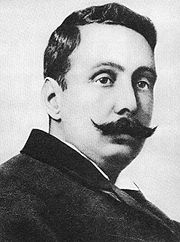
Raul Brandão
Encyclopedia

Portugal
Portugal , officially the Portuguese Republic is a country situated in southwestern Europe on the Iberian Peninsula. Portugal is the westernmost country of Europe, and is bordered by the Atlantic Ocean to the West and South and by Spain to the North and East. The Atlantic archipelagos of the...
writer
Writer
A writer is a person who produces literature, such as novels, short stories, plays, screenplays, poetry, or other literary art. Skilled writers are able to use language to portray ideas and images....
, journalist
Journalist
A journalist collects and distributes news and other information. A journalist's work is referred to as journalism.A reporter is a type of journalist who researchs, writes, and reports on information to be presented in mass media, including print media , electronic media , and digital media A...
and military officer, notable for the realism of his literary descriptions and by the lyricism of his speech. Brandão was born in Foz do Douro, a parish of Porto
Porto
Porto , also known as Oporto in English, is the second largest city in Portugal and one of the major urban areas in the Iberian Peninsula. Its administrative limits include a population of 237,559 inhabitants distributed within 15 civil parishes...
, where he spent the majority of his youth. Born in a family of sailors, the ocean and the sailors were a recurrent theme in his work.
Biography
Brandão finished his secondary studies in 1891. After that, the joined the military academy, where he initiated a long career in the Ministry of War. While working in the ministry, he also worked as a journalist and published several books.In 1896, Brandão was commissioned in Guimarães
Guimarães
Guimarães Municipality is located in northwestern Portugal in the province of Minho and in the Braga District. It contains the city of Guimarães.The present Mayor is António Magalhães Silva, elected by the Socialist Party.-Parishes:-Economy:...
, where he would know his future wife. He married in the next year and settled in the city. Despite living in Guimarães, Brandão spent long periods in Lisbon
Lisbon
Lisbon is the capital city and largest city of Portugal with a population of 545,245 within its administrative limits on a land area of . The urban area of Lisbon extends beyond the administrative city limits with a population of 3 million on an area of , making it the 9th most populous urban...
. After retiring from the army, in 1912, Brandão initiated the most productive period of his writing career. He died on December 5, 1930, age 63, after publishing a profuse journalistic and literary work.
Body of Work
Brandão was the great Portuguese modernist in terms of prose fiction, integrating a symbolist tension into his work in an attempt to transpose an apparent and deceptive reality and thereby obtain a transcendence or absoluteness that are only fumblingly formulated through writing.A fiction writer who wrote about characters that were both pathetic and grotesque in their incapacity to delineate their dream, or else were shameless in the way in which they betrayed it (A Farsa, 1903, Os Pobres, 1906). It was, however, in the novel Húmus, 1917, that he best explored the terrifyingly small dimension of human existence, enacting the tragedy of the struggle of the “town” for its “dream” and resorting to particular processes of breaking up the narrative time that anticipated the discourse of today’s fiction. He wrote several plays in the same style.
Published works
- 1890 - Impressões e Paisagens
- 1896 - História de um Palhaço
- 1901 - O Padre
- 1903 - A Farsa
- 1906 - Os Pobres
- 1912 - El-Rei Junot
- 1914 - A Conspiração de 1817
- 1917 - Húmus (1917)
- 1919 - Memórias (vol. I)
- 1923 - Teatro
- 1923 - Os Pescadores
- 1925 - Memórias (vol. II)
- 1926 - As Ilhas Desconhecidas
- 1926 - A Morte do Palhaço e o Mistério da Árvore
- 1927 - Jesus Cristo em Lisboa, with Teixeira de Pascoaes
- 1929 - O Avejão
- 1930 - Portugal Pequenino, with Maria Angelina Brandão
- 1931 - O Pobre de Pedir
- 1933 - Vale de Josafat

